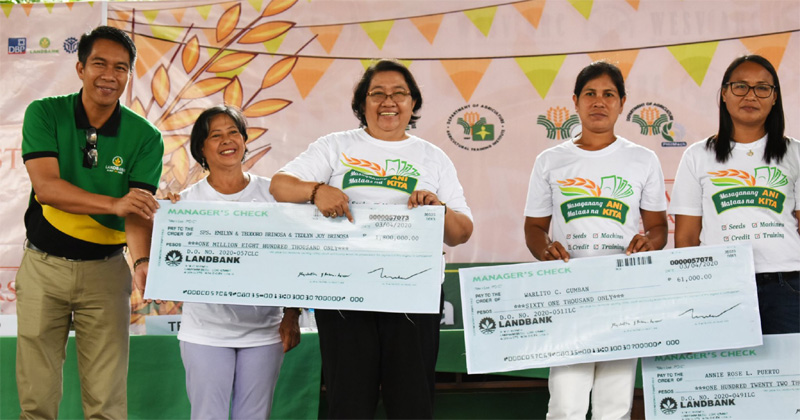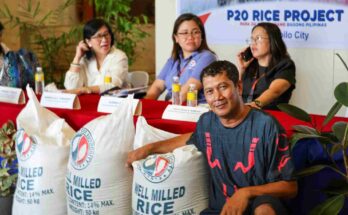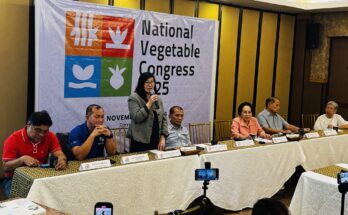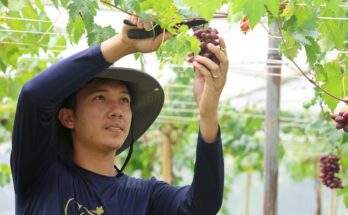The Department of Agriculture (DA) is projecting at least one metric ton per hectare incremental increase in the palay production of Western Visayas farmers who were given certified inbred seeds as part of the P760 million budget under the Rice Competitiveness Enhancement Fund (RCEF) in 2019.
According to DA Regional Executive Director Remelyn Recoter, Western Visayas’ allocation is 13 percent of the total P10 billion rice fund being implemented in the top 57 rice-producing provinces nationwide.
“Out of the P10 billion fund to be generated annually from the tariff, P5 billion is allotted for mechanization, P3 billion for seeds development, propagation, and distribution, P1 billion for credit and P1 billion for training, scholarship and extension activities,” she explained.
Starting October last year, Philippine Rice Research Institute (PhilRice) had only distributed 16 percent of the total 286,522 bags of certified inbred seeds allocated for Western Visayas.
Some of the certified seeds distributed were sourced out from Mindoro, thus causing the delay of the distribution.
“In the dry season of 2019, we have distributed 48,566 bags of certified seeds to 22,275 farmers with an estimated area planted of 23,753 hectares,” said PhilRice-Negros Regional RCEF coordinator Fennie Lyn Pantin.
This wet cropping season (April-June), PhilRice is set to distribute 359,756 bags of certified seeds to 179,879 rice farmers in the region. Meanwhile, they will start in October the distribution of 240,356 bags for the dry season of 2021.
This March, the Philippine Center for Postharvest Development and Mechanization (PhilMech) is set to turn over the farm machinery and equipment amounting to P623 million to 127 farmers’ cooperatives and associations (FCAs) in the region.
“For Region 6, we target to provide mechanization support to 123 municipalities. Each municipality will have P5 million allocation annually for the next six years,” said PhilMech Visayas cluster coordinator Engr. Romar Areño.
He also called for FCAs to submit a letter of intent to avail of the different machinery from PhilMech such as four-wheel tractor, hand tractor, floating tiller, precision seeder, walk-behind transplanter, mini thresher, rice combine harvester, and among others.
Individual farmers could also borrow low-interest capital under RCEF through Land Bank of the Philippines (LBP) and the Development Bank of the Philippines (DBP).
LBP had already released P17.657 million out of P19.776 million approved loan to 194 farmers in Region 6.
On the other hand, the DBP has a P1 million approved loan allocation for farmers in Iloilo province alone.
According to LBP Capiz Lending Center head Giovanni Baoy, they are providing P42,000 per hectare loan for hybrid rice farmers and P37,000 per hectare for inbred seed users.
Under the rice extension services component of RCEF, the Agricultural Training Institute (ATI) and the Technical Education and Skills Development Authority (TESDA) currently have 5,498 participants/students for Farmers Field Schools (FFS), 35 graduates of NC II and 173 graduates of trainers and specialist training courses.
For 2019, ATI has approved an allocation of P7.02 million while TESDA has P62.5 million, according to Dir. Recoter.
These two training arms are partnering with 10 learning sites and service providers in implementing the RCEF Rice Extension Services Programs in Western Visayas.
Dir. Recoter emphasized that for the farmers to avail of the RCEF programs, they have to be enlisted in the Registry System for Basic Sectors in Agriculture (RSBSA) and FCAs must be accredited by DA.
As to date, there are already 1,332 accredited FCAs out of the 2,578 applications in the region.
“In excess of the P10 billion RCEF will be allocated for the crop diversification program and the expanded crop insurance program of the Philippine Crop Insurance Corporation,” she added.
With the theme “Sa Rice Tariffication Law, Lahat Tayo Panalo!”, the RTL anniversary celebrated nationwide on March 5 seeks to present the accomplishments of RCEF component programs and to allay the fears of rice farmers during the transition period of RTL implementation.
DA Regional Technical Director Rene Famoso pleaded to those who criticize the new rice law “give us a two to three years to fully implement the program before we consider the law a failure.”
DA Western Visayas gathered around 200 rice value chain stakeholders in a forum held at WESVIARC, Jaro, Iloilo City
“We thank the government for providing high-quality seeds through the RCEF program. We just hope that the seeds will be distributed early for the next planting season. Also, the SURE Aid Cash Assistance from DA had benefitted 42 rice farmers in Zarraga. Because of that, we no longer need to borrow funds from private lenders with the high-interest rate to fund our farming activities,” said Felizardo Ruscales, Federation President of Zarraga, Iloilo.(SMHT/DA-RAFIS 6)



